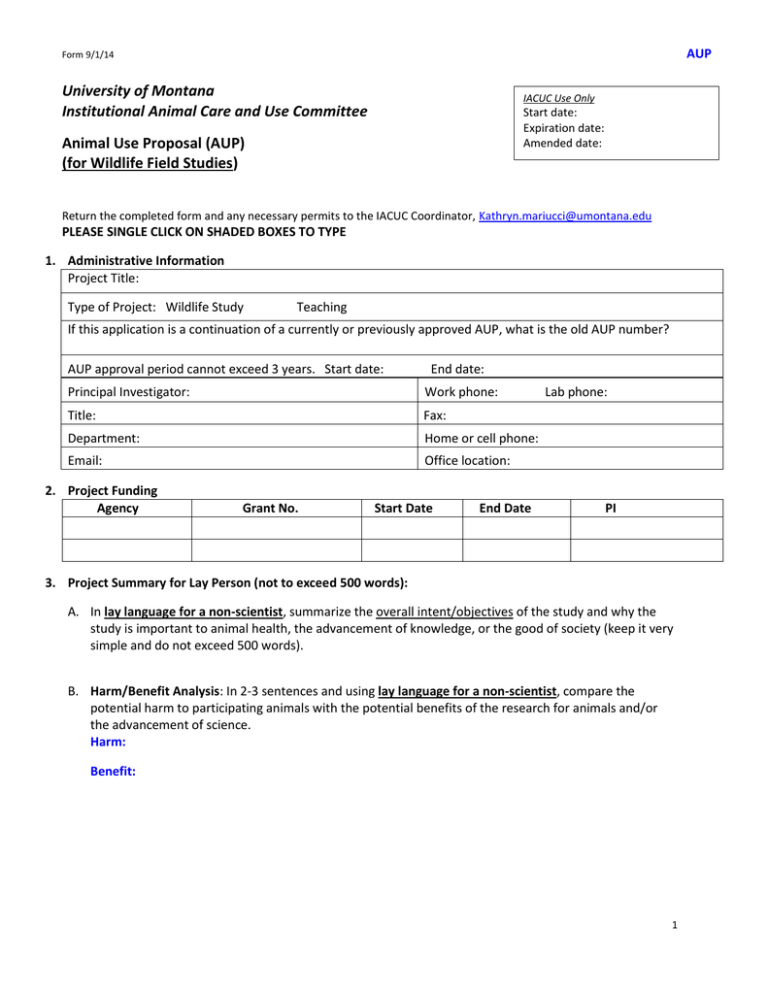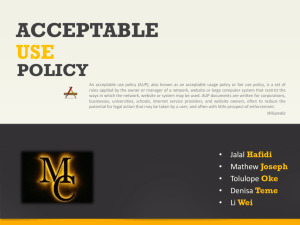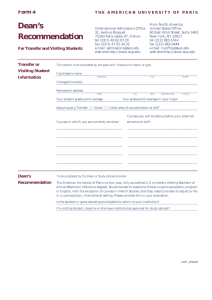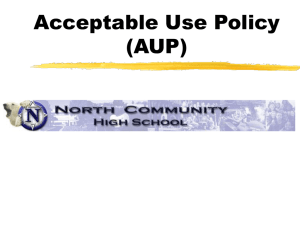University of Montana Institutional Animal Care and Use Committee
advertisement

AUP Form 9/1/14 University of Montana Institutional Animal Care and Use Committee IACUC Use Only Start date: Expiration date: Amended date: Animal Use Proposal (AUP) (for Wildlife Field Studies) Return the completed form and any necessary permits to the IACUC Coordinator, Kathryn.mariucci@umontana.edu PLEASE SINGLE CLICK ON SHADED BOXES TO TYPE 1. Administrative Information Project Title: Type of Project: Wildlife Study Teaching If this application is a continuation of a currently or previously approved AUP, what is the old AUP number? AUP approval period cannot exceed 3 years. Start date: End date: Principal Investigator: Work phone: Title: Fax: Department: Home or cell phone: Email: Office location: 2. Project Funding Agency Grant No. Start Date End Date Lab phone: PI 3. Project Summary for Lay Person (not to exceed 500 words): A. In lay language for a non-scientist, summarize the overall intent/objectives of the study and why the study is important to animal health, the advancement of knowledge, or the good of society (keep it very simple and do not exceed 500 words). B. Harm/Benefit Analysis: In 2-3 sentences and using lay language for a non-scientist, compare the potential harm to participating animals with the potential benefits of the research for animals and/or the advancement of science. Harm: Benefit: 1 AUP Form 9/1/14 4. Experience and Training List all people working on this AUP starting with the PI. Include each person’s experience with the species and the techniques listed in this proposal, or state who will train them in the proper techniques. PI Name: PI: XX Animal training approval dates: Experience: Name: Title: Department: Office Location: Email: Experience: Check (XX) if: Co-PI Contact Person Office phone: Lab phone: Animal training approval dates: Name: Title: Department: Office Location: Email: Experience: Check (XX) if: Co-PI Contact Person Office phone: Lab phone: Animal training approval dates: Name: Title: Department: Office Location: Email: Experience: Check (XX) if: Co-PI Contact Person Office phone: Lab phone: Animal training approval dates: Name: Title: Department: Office Location: Email: Experience: Check (XX) if: Co-PI Contact Person Office phone: Lab phone: Animal training approval dates: Name: Title: Department: Office Location: Email: Experience: Check (XX) if: Co-PI Contact Person Office phone: Lab phone: Animal training approval dates: Name: Title: Department: Office Location: Email: Experience: Check (XX) if: Co-PI Contact Person Office phone: Lab phone: Animal training approval dates: 2 AUP Form 9/1/14 5. Study Objectives Briefly describe the purpose and specific aims of the research. If this is a triennial resubmission, include summaries of findings during the previous 3 years of work and how this work will be expanded upon in the next 3 years. 6. Detailed Description of the Use of Animals A. Where applicable to your study, provide the information requested 1) Location of study Describe the field site location (i.e. country, state, county, city, address, land owner). 2) Target species List the target species 3) Field site supervision Name the personnel who will be in charge at the field site(s) supervising seasonal workers 4) Personal protective equipment List personal protective equipment and safety procedures specific to projects involving potential exposure of personnel to zoonotic diseases 5) Animal capture and restraint Describe all capture and restraint methods including trapping methods to be used, frequency of checking traps, length of time animals will be held in traps, and if food, water and provisions for inclement weather are provided in traps. Describe potential non-target species that may be trapped and their disposition. 6) Animal immobilization agents Describe immobilization agents used and describe precautions taken to protect the animal and investigator. 7) Animal identification and tracking methods Describe details of ear tagging, tattoos, collars, etc. and include potential long term effects of the device used on the animal 8) Non-invasive manipulations Describe non-invasive manipulations such as weighing and measuring and the type and duration of restraint necessary 9) Injections Describe injection method, injected material, injection site, volume, frequency, needle size, etc. 10) Anesthesia Briefly describe here and provide complete details in Part 7 anesthesia table. 3 AUP Form 9/1/14 11) Blood collection and tissue collection Describe volume, frequency, collection site, needle size, protective equipment, methodology, etc. 12) Non-pharmaceutical grade compounds List any non-pharmaceutical grade drugs, biologics, or reagents that will be administered to animals and provide a scientific justification for their use and describe methods that will be used to ensure appropriate preparation and administration (e.g. Avertin). 13) Survival surgery Describe surgery in detail 14) Animal pain or distress (also see Part 10 of form) Describe any anticipated adverse effects on animals. 15) Detecting pain, distress or failing health Describe the physical parameters used to determine pain or distress. Provide details of monitoring the animals during capture, handling and post release. 16) Animals transported from the field to a housing facility or different location Describe how the animals be transported from the field: caging, food, water, etc. Describe where will they be housed and under what conditions. Who will be responsible for their husbandry and health monitoring? How long will they be held in captivity and what will happen to them at the end of the study? 17) Collaborating State or wildlife agencies List any State or wildlife agencies collaborating on this research and their level of involvement. If they are primarily responsible for animal handling and care, include documentation of their level of training and the procedures which they will follow for animal care 18) Other procedures or relevant information Describe any other procedures or information relevant to this AUP 19) Tissues collected after euthanasia List tissues to be harvested following euthanasia 20) Historical animal injury and mortality Describe historical animal morbidity and mortality rates associated with your capture and animal handling methods. If expected historical morbidity and mortality are significant, please describe methods that will be utilized to ameliorate these effects. 21) Euthanasia (also see Part 11 of form) Briefly describe the method of euthanasia. You should always list a contingency plan for euthanasia in the unlikely event that serious injury or illness should occur to an animal in remote field conditions. Specify your plan for providing veterinary care or humane euthanasia and for final disposition of the animal. 4 AUP Form 9/1/14 B. Briefly describe any additional information that is important for understanding how the animals are to be used in the course of the study. 7. Anesthetics, Medical Treatments and Euthanasia Agents A. Specify in the table below any drug you may use to anesthetize, provide medical treatment (analgesics, antibiotics, NSAIDs, etc.) and/or euthanize research animals. Where anesthetic combinations are called for, list each drug separately. Reason for Use Drug Dose Route Expected Duration of Drug Effects Note: Expired drugs are not approved for use in survival procedures performed on live vertebrate animals. Only medical grade drugs should be used unless they are unavailable, or scientific justification is provided for use of non-medical grade drugs. B. List who will administer the anesthesia/euthanasia agents and the qualifications of each person listed. C. Name the veterinarian of record if it will not be the UM Attending Veterinarian. 8. Animals Complete a separate column for each species to be used. Please include all information that applies to the animals you propose to use in this proposal. A B C Species (common name) Gender M Both F M Both F M Both F Age categories Number of animals/year D E F Species (common name) Gender M F Both M F Both M Both F Age categories Number of animals/year 5 AUP Form 9/1/14 9. Justification for Animal Use A. List the procedures and number of animals to be used in the table below. Procedure Animals/Year B. State your rationale for the animal numbers to be used for each procedure. If you use statistics to justify the number of animals to be used, please briefly describe the power analysis, input parameters and output. 10. Experimental Stress and Pain A. Indicate the appropriate pain and distress category(ies) and the number of animals in each. Sums should equal the total animals from Part 8 above. Pain and Distress Category (based on USDA categories) Number of animals per year Year 1 Year 2 Year 3 TOTALS Pain and distress category C – minimal, transient, or no pain or distress Pain and distress category D1 – pain or distress relieved by appropriate measures Pain and distress category E1, 2 - unrelieved pain or distress 1, 2For category D or E animals, the results of a targeted literature search for alternatives to painful and distressful procedures must be provided below and you will be requested to provide detailed search results. 1) List a minimum of 2 data bases consulted (e.g., PubMed, Agricola, Toxline, Biological Abstracts, Web of Science. NOTE: Google Scholar is not an acceptable data base at this time. i. ii. Additional databases: 2) Date of search: 3) Years covered by search: 4) Key words or search strategies used (e.g., analgesics, reduce pain, non-invasive, training): 5) Provide a brief summary of your search results: 2For category E animals, a scientific justification is required to explain why anesthetics, analgesics, sedatives or tranquilizers during and/or following painful or distressful procedures will not be used. 6 AUP Form 9/1/14 11. Euthanasia and Final Disposition of Animals A. If animals will not be euthanized, check (XX) disposition: Return to wild Other, explain: B. If animals will be euthanized: 1) Provide scientific justification for decapitation or cervical dislocation without anesthesia 2) Who will be responsible for carrying out the final disposition of the animals? 3) Where will the final disposition take place? 12. Use of Drug Enforcement Agency (DEA) Regulated Controlled Substances Note: By signing this animal use proposal (AUP) you agree to abide by all UM policies and procedures for use of controlled substances. Unauthorized use of DEA controlled substances may result in suspension of the AUP. A. Will this project involve any DEA controlled substances? Yes No B. If you answered YES : 1) The PI or the veterinarian of record will have a valid DEA controlled substance registration BEFORE use of controlled substances under this AUP, www.deadiversion.usdoj.gov/webforms/ 2) Provide name on DEA controlled substance registration and registration number. 13. Federal, State and/or International Permits A. Are federal, state or international permits required? Yes No B. Attach copies of all permits as an email attachment. NOTE: It is unlawful to begin work until all federal or state permits required for your research have been issued. C. List all permits Federal Permits Agency Type of Permit Permit Number State Permits Agency Type of Permit Permit Number International Permits Agency Type of Permit Permit Number 7 AUP Form 9/1/14 14. Principal Investigator’s Statement check [XX] box: I agree the statements made in this AUP are accurate and complete. I agree animal usage in this AUP does not unnecessarily duplicate previous experiments. I agree to inform the IACUC in writing of any emergent problems. I further agree not to proceed with the project until the problems have been resolved. I agree not to make changes to procedures involving animals without submitting a written amendment to the IACUC and will not undertake such changes until the IACUC has reviewed and approved them. I agree not to take the media to the field without prior approval by the IACUC. I agree that all photographs and videotapes of research animals and/or personnel will be for documentation of my research and for scientific purposes. I agree is my responsibility to ensure that every person assigned to this AUP is appropriately trained. I agree it is my responsibility to ensure that every person assigned to this AUP has read and understands the AUP and their role in the project. I agree that work on the procedures described in this AUP will not commence until I receive notice of approval from the IACUC. I agree to keep a copy of this AUP and all subsequent correspondence. Name of Principal Investigator: Date: Note: I AM AWARE THAT ELECTRONIC SUBMISSION OF THIS FORM FROM MY COMPUTER CONSTITUTES MY SIGNATURE. 8



